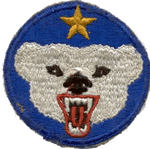World War II in the Aleutians - Shemya (APO 729)
January 26, 1943 to January 27, 1946
1. Recap of Army Facilities
Ft. Benjamine Harrison, Indiana
Ft. McClellan - Anniston, Alabama
Ft. Lawton - Seattle, Washington
4. Shemya
7. My Outfit
8. My Buddies
12. Potpourri
14. Coincidences
Following are four events when I returned home, before and after
discharge:
+ + + While being shuffled around the country in 1943, I found myself in a
Replacement Depot,
three or four weeks, nothing exciting happened. For two of those weeks
another 19-year old and I were given an assignment.
A building was used to store the barracks bags of soldiers who had gone
A.W.O.L. Our job was to guard the bags (hundreds) and not to allow
anyone in without authorization. Aside from reading, listening to 78 RPM
records of the 1920's and 1930's, and "chewing the fat", the experience was
not the highlight of my army experience.
Two and a half years later however, while turning in some equipment and
extra clothes at
on an outlet. I recognized him - - - he recognized me - - - my two week
buddie from Shenango. The time span since our paths crossed - - - Aug. "43
to Dec. "45.
He ended up in
and became an electrician's apprentice.
+ + +
G.I.'s ready to be discharged. When I arrived, they gave 30-day furloughs to ease
the overflow. Still in uniform, and ordered to return in 30 days, I spent the next
month visiting the folks I left behind in
and
enough to be my wife since 1948. At times she may disagree!
One cold morning, walking down the street in
in a civilian overcoat approached. One of his coat sleeves was pinned up. It took a
few seconds but we remembered each other from basic training
in
in 1943. Harold Butz, it turned out, was a B.A.R. man (browning automatic rifle).
While attacking a German position with others in
looked down, and couldn't see his B.A.R. or his arm. His next memory was waking
up in an Army Field Hospital.
We went up to my temporary quarters, and while reminiscing, I pulled out the photo
scroll of our entire company, about 200 men, cooks, officers etc. at Ft. Mc Clellen.
Most of the company, with the exception of 50 or so, stayed together, participated in
the second wave at
I was one of the lucky 50 who went in a different direction. Sadly he
pointed out many men who didn't make it, some of whom were in my
barracks. I estimate, as he pointed out the fallen, that one-third of the
outfit did not come home.
+ + + "
civilian clothes, I was walking on
heard my name called out. One of the three fellows walking was in my
outfit on Shemya. I remembered him well (although don't recall his
name). His great love was playing the clarinet, and the war was a mere
distraction which kept him from from playing in a band.
Company officers tried to avoid transfers, mainly because of the paperwork,
but also setting a precedent, and convincing the recipient that the reason
was valid.
He was very persistent over a 10 - 12 month period, almost on the edge of
insubordination. It turned out that the officer was getting tired of him,
determined that we were a bit overstaffed at that time, and arranged for his
transfer to the Post Band. P.S. I was introduced to the two fellows with
him and as it turned out, all three were in a band going to rehearsal!
+ + + Again in
of a large store. This was in 1946, about a year after I was discharged. I
didn't recognize the man behind the men's shirt counter but he obviously
knew me.
Since I always had "wheels" at my disposal, as Supply Sergeant on Shemya,
I was occasionally called upon to transport people in adjoining outfits
if the need was urgent.
He reminded me of coming to the rescue, although I didn't remember his
name or the occasion. What is amazing is that while I was walking
at a fast pace through the aisle, in civilian garb, he remembered me and
my name.
